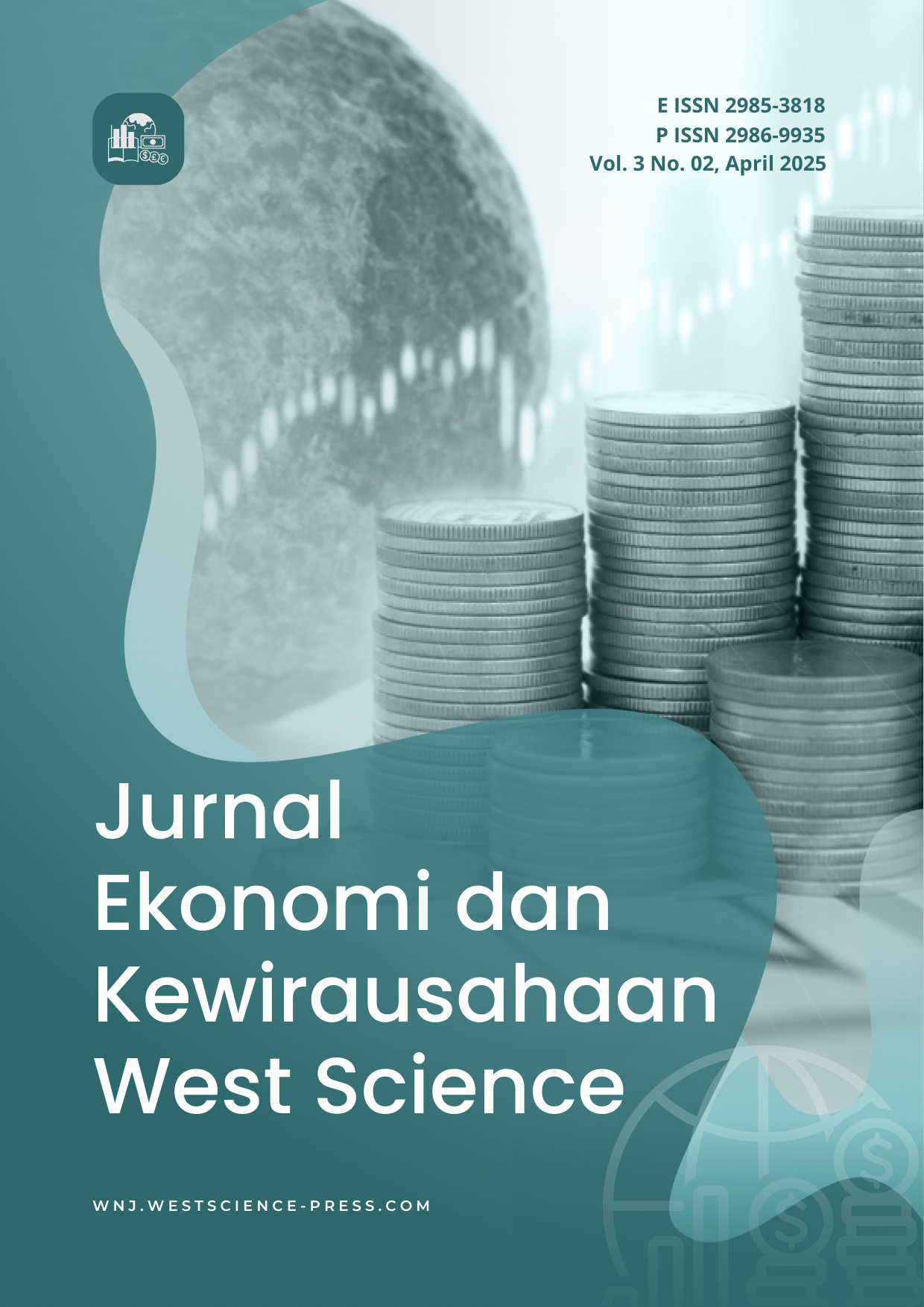Analisis Dampak Kebijakan Ekonomi Hijau, Peraturan Lingkungan, dan Tanggung Jawab Perusahaan terhadap Keberlanjutan Bisnis di Indonesia
DOI:
https://doi.org/10.58812/jekws.v3i02.2136Kata Kunci:
Kebijakan Ekonomi Hijau, Regulasi Lingkungan, Tanggung Jawab Korporat, Keberlanjutan BisnisAbstrak
Penelitian ini mengkaji dampak kebijakan ekonomi hijau, regulasi lingkungan, dan tanggung jawab korporasi terhadap keberlanjutan bisnis di Indonesia. Dengan pendekatan kuantitatif, penelitian ini mensurvei 150 perusahaan dan menganalisis data menggunakan Structural Equation Modeling dengan Partial Least Squares (SEM-PLS 3). Temuan menunjukkan bahwa ketiga faktor tersebut memiliki dampak yang signifikan dan positif terhadap keberlanjutan bisnis. Secara spesifik, kebijakan ekonomi hijau mendorong praktik bisnis berkelanjutan dengan memberikan insentif untuk strategi ramah lingkungan, sementara regulasi lingkungan yang ketat mendorong keberlanjutan yang didorong oleh kepatuhan. Selain itu, tanggung jawab korporat, yang mencakup praktik etis dan keterlibatan komunitas, memainkan peran krusial dalam meningkatkan keberlanjutan bisnis. Hasil penelitian menyoroti pentingnya bagi bisnis untuk mengadopsi strategi keberlanjutan yang komprehensif yang selaras dengan kebijakan pemerintah, persyaratan regulasi, dan tanggung jawab sosial korporat. Studi ini memberikan implikasi penting bagi pembuat kebijakan, pemimpin bisnis, dan peneliti, mendorong pendekatan yang lebih terintegrasi terhadap keberlanjutan di sektor bisnis.
Referensi
Arifin, R., Masyhar, A., Sumardiana, B., Ramada, D. P., Kamal, U., & Fikri, S. (2024). Indonesian sustainable development policy: How the government ensures the environment for future generations. IOP Conference Series: Earth and Environmental Science, 1355(1), 12005.
Ciubotariu, M., Sandulachi, A.-M., Grosu, V., Hlaciuc, E., & Macovei, A. (2022). The Effects of CSR Policies in Maintaining the Sustainability of SMEs in Times of Crisis. Global Conference on Business and Social Sciences Proceeding, 14, 1. https://doi.org/10.35609/gcbssproceeding.2022.2(68)
Dahlan, M. (2018). The Effect of Management Accounting Systems on Company Performance, External Environmental Uncertainty as a Moderating Variable. Indonesian Journal of Business, Accounting and Management, 1(01), 55–66.
Demko-Rihter, J., Sassanelli, C., Pantelic, M., & Anisic, Z. (2023). A Framework to Assess Manufacturers’ Circular Economy Readiness Level in Developing Countries: An Application Case in a Serbian Packaging Company. Sustainability (Switzerland), 15(8). https://doi.org/10.3390/su15086982
Diartho, H. C. (2023). Alternative Strategies for Economic Sustainability and Increased Environmental Protection in Indonesia Incorporate the Green Growth Framework and Financial Deepening. Society, 11(2), 697–714.
Elkington, J. (1997). The triple bottom line. Environmental Management: Readings and Cases, 2, 49–66.
Fitri, I., Marisa, A., & Sitorus, R. (2020). Heritage conservation roadmap for the historic city of Medan, Indonesia. IOP Conference Series: Materials Science and Engineering, 801(1), 12031.
Gao, F., Nketiah, E., & Shi, V. (2024). Understanding and Enhancing Food Conservation Behaviors and Operations. Sustainability (Switzerland) , 16(7). https://doi.org/10.3390/su16072898
Gao, J., Xu, N., & Zhou, J. (2023). Does Digital Transformation Contribute to Corporate Carbon Emissions Reduction? Empirical Evidence from China. Sustainability (Switzerland), 15(18), 1–20. https://doi.org/10.3390/su151813414
Hakim, A. R., & Asfiah, N. (2024). Driving sustainability in Indonesia: the importance of corporate citizenship in realizing sustainable development goals. Mednarodno Inovativno Poslovanje= Journal of Innovative Business and Management, 16(2), 1–16.
Harris, J. M. (2023). Green economy. In Elgar Encyclopedia of Ecological Economics (pp. 284–288). Edward Elgar Publishing.
Herlucky, J. F. A., & Laudia, L. A. (2024). Dilema Penerapan Pajak Karbon di Indonesia: Antara Komitmen Lingkungan dan Ketahanan Ekonomi Industri. Journal of Accounting and Finance Management, 5(5), 1189–1195.
Hill, H., & Pasaribu, D. (2024). Indonesia and the resource curse: economic and environmental dimensions. In The Indonesian Economy and the Surrounding Regions in the 21st Century: Essays in Honor of Iwan Jaya Azis (pp. 65–96). Springer.
Hu, S., Zeng, G., Cao, X., Yuan, H., & Chen, B. (2021). Does technological innovation promote green development? A case study of the Yangtze River Economic Belt in China. International Journal of ….
Lambin, J.-J., & Lambin, J.-J. (2014). A Green Economy. Rethinking the Market Economy: New Challenges, New Ideas, New Opportunities, 59–85.
Lee, C. C., & Hussain, J. (2022). Carbon neutral sustainability and green development during energy consumption. In Innovation and Green Development. Elsevier.
Lukman, H., Suhendah, R., & Evan, J. (2020). Analysis Corporate Social Responsibility and Environmental Performance Report Forward Financial Performance on Proper Ranking Companies in Indonesia.
Makridou, G., Doumpos, M., & Lemonakis, C. (2023). Relationship between ESG and corporate financial performance in the energy sector: empirical evidence from European companies. International Journal of Energy Sector Management, ahead-of-p(ahead-of-print). https://doi.org/10.1108/IJESM-01-2023-0012
Narotama, B., Achsani, N. A., & Santoso, M. H. (2023). Corporate Environmental, Social, and Governance (ESG) and SMEs’ Value (a Lesson From Indonesian Public SMEs). Indonesian Journal of Business and Entrepreneurship (IJBE), 9(2), 197.
Respati, B. W., Ihwanudin, M., & Kurniawati, M. (2023). Pengaruh Kualitas Kehidupan Kerja dan Keseimbangan Kehidupan Kerja Terhadap Performa Karyawan: Peran Mediasi Kepuasan Kerja. Jurnal Manajerial, 10(02), 179. https://doi.org/10.30587/jurnalmanajerial.v10i02.5363
Rodiyah, R., Arifin, R., Wulansarie, R., Baiquni, M. I., & Zainurohmah, Z. (2023). Capturing the Opportunity of Green Economic Policy for Environmental Sustainability. IOP Conference Series: Earth and Environmental Science, 1248(1), 12035.
Sheehy, B., & Damayanti, C. (2019). Sustainability and legislated corporate social responsibility in Indonesia. Cambridge Handbook of Corporate Law, Corporate Governance and Sustainability (Cambridge University Press, Forthcoming), University of Oslo Faculty of Law Research Paper, 2019–38.
Singgih, G. G., & Famiola, M. (2025). Core Values of Sustainable Innovation in Indonesian SMEs. In Core Values and Decision-Making for Sustainable Business: An International Perspective (pp. 39–74). Springer Nature Switzerland Cham.
Singh, A. (2023). Green economic policies, strategies & initiatives of India. EAI Endorsed Transactions on Energy Web, 10(1).
Wahida, K., & Uyun, H. (2023). Tatanan Indonesia dalam mewujudkan pertumbuhan ekonomi berkelanjutan melalui green economy. Harmoni: Jurnal Ilmu Komunikasi Dan Sosial, 1(2), 14–26.
Wang, X., Song, X., & Sun, M. (2023). How Does a Company’s ESG Performance Affect the Issuance of an Audit Opinion? The Moderating Role of Auditor Experience. International Journal of Environmental Research and Public Health, 20(5). https://doi.org/10.3390/ijerph20053878
Wentzel, L., Fapohunda, J. A., & Haldenwang, R. (2023). A Corporate Social Responsibility (CSR) Model to Achieve Sustainable Business Performance (SBP) of SMEs in the South African Construction Industry. Sustainability, 15(13), 10007.
سعاد, ه. (2024). الاقتصاد الأخضر كحل لتحقيق التنمية المستدامة. Scientific Journal of King Faisal University, Humanities & Management Sciences, 25(1).
Unduhan
Dimensions
Diterbitkan
Terbitan
Bagian
Lisensi
Hak Cipta (c) 2025 Loso Judijanto, I Made Adi Suwandana

Artikel ini berlisensiCreative Commons Attribution-ShareAlike 4.0 International License.






















 Instagram
Instagram 